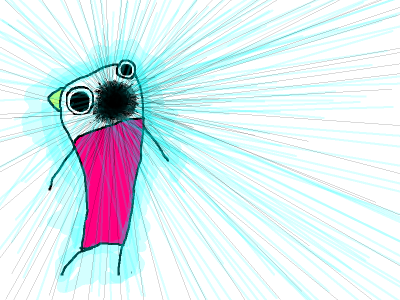While patiently listening to my I-Ate-Too-Much-I-Feel-Gross-You-Should-Have-Stopped-Me-At-The-99th-Cookie episodes, he says things like (this is an actual quote from him): Why don't you just stop putting the brownies in your mouth?
So, what's wrong with me?
 |
| (thanks for sharing your pictures, Allie Brosh) |
The beauty of learning about mindful eating is that now I know there's nothing wrong with me at all.
My eating habits are the product of my DNA, my forebears' DNA, the culture I'm submerged in, and the lifetime of patterns, habits, and experiences that have moulded my brain. The same is true for you, by the way. The really great news is that there is a huge component of all those factors that we do have the ability to change: the neurological patterns that have been laid down over our lifetimes. By doing the mindful eating practices, I can create new pathways and associations in my brain.
You may recall Pavlov's dog...or you may be familiar with neuroplasticity. Rewiring the brain doesn't happen through force of willpower. So, making so-called mistakes doesn't mean you have a lack of willpower or some other flaw. It just means you're making food choices based on EVERYTHING that's going inside you - your moods, your habits, your cravings, your chemistry. With more mindful eating practice, you might make a different choice. Pavlov didn't force his dog to drool by pulling on its lips. He patiently and consistently created new associations that led to new behaviours. The dog wasn't "bad" or "weak" if it drooled at the wrong time. I am not bad if I eat a cookie or 3. (I know this is not a perfect analogy. Don't worry about it.)
The relief of letting go of self-recrimination is energizing. If I make an unhealthy or less-than-mindful food choice, I don't waste energy being upset about it, or thinking "oh well I might as well eat the other half of the pizza now", or worrying that my pants won't fit tomorrow. Now I acknowledge that it was a choice I made, it's done, and the next choice I make can be a mindful one. I can think about why I might have made that unhealthy choice, but I don't need to get all judgy and hang-uppy about it. What a refreshing approach.
Like 21st century public school, there's no failing or cheating at mindful eating. It's all about showing up and staying awake.
No comments:
Post a Comment
Tell me about your experience with mindful eating